Archives - Regards sur nos publications
 © Daguerréotype, 1855, CC0 Public Domain Designation, Chicago Art Institute.
© Daguerréotype, 1855, CC0 Public Domain Designation, Chicago Art Institute.Cette page présente par ordre de parution les débats et les analyses suscités par les publications scientifiques des chercheur-e-s du CERI au cours du trimestre.
Vous y trouverez, entre autres, des entretiens, vidéos, podcasts et comptes rendus qui contribuent à prolonger et à enrichir la réflexion développée dans ces travaux.
Toutes ces ressources sont librement accessibles en ligne, sauf les recensions parues dans des revues à comité de lecture.
Au-delà de cette page,
la liste complète des publications scientifiques.
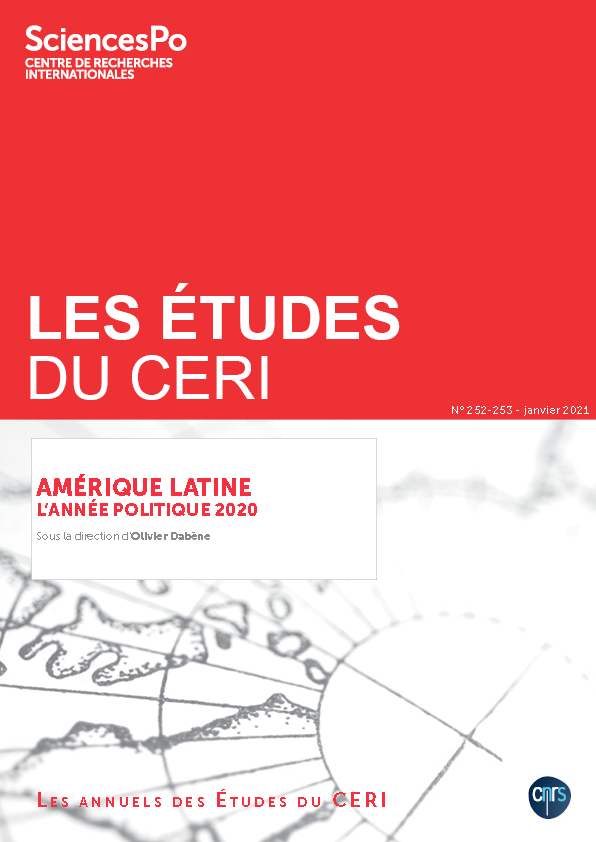
Olivier Dabène (dir.)
Les Etudes du CERI, n°252-253, janvier 2021.
Amérique latine - L’Année politique 2020 est une publication de l’Observatoire politique de l’Amérique latine et des Caraïbes (Opalc) du CERI-Sciences Po. Elle prolonge la démarche du site www.sciencespo.fr/opalc en offrant des clés de compréhension d’un continent en proie à des transformations profondes.
Autour de la publication
Vidéo
8 mars 2021
Introducing the Protestas webseries. Comparing Social Movements Across Latin America
Olivier Dabène
Entretiens du CERI
18 janvier 2021
Amérique latine. L’année politique 2020
Entretien avec Olivier Dabène, par Corinne Deloy
Latin America, One Year On
Interview with Olivier Dabène, by Corinne Deloy
Ressources
Amérique latine
Sélection de ressources en ligne et d'ouvrages récents (depuis 2010) sur l'Amérique latine.
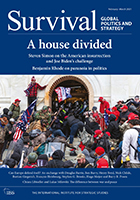
Stephen G. Brooks et Hugo Meijer
Europe Cannot Defend Itself: The Challenge of Pooling Military Power
Forum: Can Europe Defend Itself?, Survival, Vol. 63, n°1, 2021.
Europe is unable to pool and effectively employ military power due to its lack of an integrated command structure and its deficient C4ISR capacity.
Autour de la publication
Vidéo
08 mars 2021
Can Europe defend itself?
International Institute for Strategic Studies Webinar with Hugo Meijer
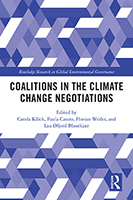
Carola Klöck, Paula Castro, Florian Weiler, Lau Øfjord Blaxekjær (eds)
London, Routledge, 2020, 240 p.
This edited volume provides both a broad overview of cooperation patterns in the UNFCCC climate change negotiations and an in-depth analysis of specific coalitions and their relations. Over the course of three parts, this book maps out and takes stock of patterns of cooperation in the climate change negotiations since their inception in 1995. In Part I, the authors focus on the evolution of coalitions over time, examining why these emerged and how they function. Part II drills deeper into a set of coalitions, particularly "new" political groups that have emerged in the last rounds of negotiations around the Copenhagen Accord and the Paris Agreement. Finally, Part III explores common themes and open questions in coalition research, and provides a comprehensive overview of coalitions in the climate change negotiations. By taking a broad approach to the study of coalitions in the climate change negotiations, this volume is an essential reference source for researchers, students, and negotiators with an interest in the dynamics of climate negotiations.
Autour de la publication
Entretiens du CERI
16 février 2021
Les coalitions dans les négociations pour le climat
Entretien avec Carola Klöck, par Miriam Périer
18 janvier 2021
Why Join a Coalition? Climate Change and International Negociation
Interview with Carola Klöck, by Miriam Périer
Ressources
Chronicles From the Field: COP 25
Short field notes and chronicles by Carola Klöck during the COP 25 meeting in Madrid
Environnement
Sélection de ressources en ligne et d'ouvrages récents (depuis 2009) sur l'environnement, le changement climatique et les catastrophes naturelles.
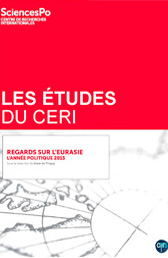
Anne de Tinguy (dir.)
Les Etudes du CERI, n°254-255, février 2021.
Regards sur l’Eurasie. L’année politique est une publication annuelle du Centre de recherches internationales de Sciences Po (CERI) dirigée par Anne de Tinguy. Elle propose des clefs de compréhension des événements et des phénomènes qui marquent de leur empreinte les évolutions d’une région, l’espace postsoviétique, en profonde mutation depuis l’effondrement de l’Union soviétique en 1991. Forte d’une approche transversale qui ne prétend nullement à l’exhaustivité, elle vise à identifier les grands facteurs explicatifs, les dynamiques régionales et les enjeux sous-jacents.
Autour de la publication
Podcast
11 février 2021
L'Eurasie à l'épreuve du Covid 19
Débat avec les auteurs à l'occasion de la publication de Regards sur l’Eurasie
Entretiens du CERI
8 février 2021
Regards sur l’Eurasie. L’année politique 2020
Entretiens avec Anne de Tinguy et Olga Belova, par Corinne Deloy
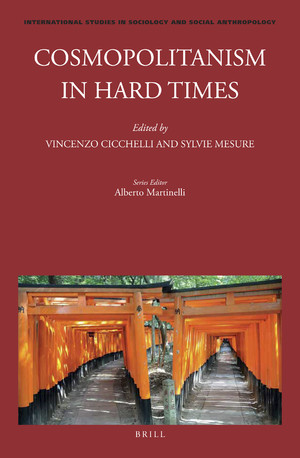
In Cosmopolitanism in Hard Times, Vincenzo Cicchelli and Sylvie Mesure (Eds), Leiden & Boston, Brill Publishers, 2021.
‘I speak ... as a fellow citizen of the world’ (Obama, 2008). These were the words used by Barack Obama in Berlin in July 2008 during his first presidential campaign. If he explicitly echoed another very well-known assertion, that of President Kennedy ‘Ich bin ein Berliner,’ Obama seems here a cosmopolitan candidate. This interpretation relies not only on his own life, which is, to a certain extent, cosmopolitan; his father was Kenyan and he spent part of his childhood in Indonesia. He also elaborates his speeches by referring to this cosmopolitan tradition of thought (Hammack, 2010). In fact, his election generated hope not only in the United States but also in the rest of the world. This first black man who accessed to the highest political responsibility of the country embodies a cosmopolitan president. Peoples felt that his presidency would be as beneficial to Americans as to the nationals of other countries. The Nobel Peace Prize he received shortly after his enthronement strengthened such feeling. Indeed, Barack Obama would be a Kantian in the Oval Office (Selzer, 2010)...
Autour de la publication
Entretiens du CERI
29 janvier 2021
Penser l’hégémonie dans le monde contemporain
Entretien avec Frédéric Ramel, par Miriam Périer
Is There a Possible Dialogue Between Hegemony and Cosmopolitanism?
Interview with Frédéric Ramel, by Miriam Périer
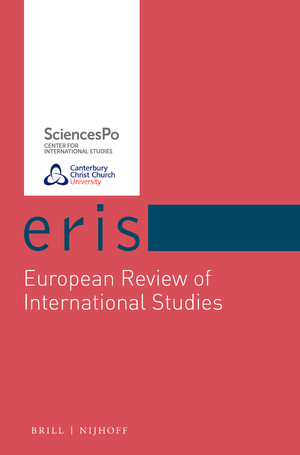
Ariel Colonomos et Richard Beardsworth (dir.)
Plausible Norms of Warfare: Reducing the Gap Between the Normative and the Empirical
European Review of International Studies, 7 (2-3), Brill, décembre 2020.
This special issue argues in favor of a new approach to the study of norms of warfare, which combines a normative analysis of ethical problems arising in war with an explanatory analysis of the use of force. Norms of warfare go as far back as Antiquity, and their study has followed a long historical path. In recent years, the ethics of war, mostly grounded in philosophy, has considerably expanded as a field. Notwithstanding such efforts to refine our normative knowledge of what should be just norms for the use of force, we argue that a more interdisciplinary approach is required to orient the study of the laws of war. In this Special Issue, proposals are made that, along with normative analysis, bring to the discussion not only disciplines such as political science and international relations, but also social theory, psychology and the neurosciences. We argue from a non-ideal perspective, that in order for norms to be just, they need to be ‘plausible’ for those who should abide by them. They also need to make sense in the context of democratic societies that favor a pluralistic debate on justice and ethics. Epistemically, we argue that, in order to understand if norms are plausible and just, reducing the gap between the normative and the empirical is required.
Autour de la publication
Entretiens du CERI
04 janvier 2021
Plausible Norms of Warfare
Interview with Richard Beardsworth, by Christian Lequesne and François Rocchi










